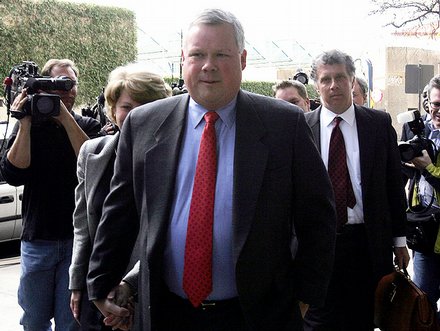 The mainstream media covering the criminal trial of former key Enron executives Ken Lay and Jeff Skilling continues mostly to miss the point that the prosecution’s case over almost seven weeks now has been extraordinarily weak for a case of this magnitude.
The mainstream media covering the criminal trial of former key Enron executives Ken Lay and Jeff Skilling continues mostly to miss the point that the prosecution’s case over almost seven weeks now has been extraordinarily weak for a case of this magnitude.
Virtually all of the substantive testimony has come from prosecution witnesses testifying under draconian plea deals, most of the testimony alleging wrongdoing has been uncorroborated, and documentary evidence to back up claims of wrongdoing has been almost non-existent.
Of course, no one knows what effect any of this is having on the jurors, some of whom may already have been swayed to convict simply by the overwhelming media bias against Lay and Skilling.
Yesterday’s testimony was a case in point. Three witnesses testified and not one of them came close to implicating either Lay or Skilling in a crime.
Vince Kaminski, a former high-level Enron risk analyst, testified that he warned that some of Enron’s special purpose entity structures were inherently risky, but that management went ahead with the deals, anyway.
Johnnie Nelson, a colorful former Enron pipeline worker who was offered by the prosecution for the transparent purpose of entertaining the jury, testified that he was angry with Lay because he, like Lay, invested virtually all of his personal savings in Enron stock that turned out to be worthless.
Finally, Chris Loehr, a seemingly nice young man who worked for one of the special purpose entities that Fastow managed, confirmed that Fastow told him about Fastow’s secret “Global Galactic” agreement that supposedly guaranteed that the SPE’s would not lose money on a number of their deals with Enron, but could not corroborate Fastow’s testimony that Skilling knew about it.
Now, there is a prosecution witness who could corroborate Fastow’s testimony about the Global Galactic agreement — former Enron CFO and former Lay-Skilling co-defendant, Richard Causey. Fastow claimed that he worked out the terms of the Global Galactic deal with Causey, who Fastow claimed disclosed it to Skilling. Causey entered into a plea deal with the Enron Task Force on the eve of trial and, thus, is readily available to testify.
But in a stunning development that has gone largely unreported in the media covering the trial, it now appears that the Enron Task Force will not call Causey as a witness to corroborate Fastow’s testimony. The NY Times’ Alexei Barrionuevo — Kurt Eichenwald‘s colleague who is one of the few reporters covering the trial expressing increasing skepticism regarding the prosecution’s case — reports on this development in his latest dispatch on the trial:
A looming question is when, or if, Richard A. Causey, Enron’s former chief accounting officer, will testify in the case. He could be crucial to supporting Mr. Fastow’s claims that Mr. Skilling was shown a list of side deals that Mr. Fastow kept track of.
Mr. Causey is not on the government’s witness list. But prosecutors say that does not preclude them from calling him in a rebuttal that would follow the expected testimony of Mr. Skilling and Mr. Lay. Mr. Causey pleaded guilty to fraud in December, just one month before the trial started.
Mr. Fastow testified for four days about the partnerships and about secret side deals he said he made with Mr. Skilling that guaranteed the partnerships would profit from purchasing distressed Enron assets. But during three days of cross-examination by defense lawyers, Mr. Fastow admitted to stealing tens of millions of dollars from Enron while deceiving his bosses and even his own wife about much of his illicit activity.
The government knew that calling Mr. Fastow brought inherent risks, but chose to call him anyway.
Barrionuevo is spot on. If the Task Force does not call Causey, then that means he cannot corroborate the key testimony of the primary prosecution witness in the trial to date. That would blow a huge hole in what is already a shaky prosecution case and — if the jurors have not already made up their minds to convict — could well be the basis of reasonable doubt about the prosecution’s entire case.
Where is Waldo?, indeed.

Why wouldn’t the defense call Waldo and “blow a huge hole in what is already a shaky prosecution case”.
Who knows? They just might. But it’s still the prosecution’s case to prove beyond a reasonable doubt, and the prosecution’s election not to call Causey on such a key issue certainly could be construed to establish reasonable doubt on that issue.
My guess is that the defense is far more afraid of Waldo than the prosecution. At this point the prosecution probably feels pretty confident about their case and they just want to keep some “heavy artillery” in reserve in case they might need it. If they don’t need it then no harm done.
As Mr. Churchill said, “When you have to kill a man it costs nothing to be polite.”
TK offers the observation, “But it’s still the prosecution’s case to prove beyond a reasonable doubt . . .”
TK, this is the fundamental flaw in your daily posts. The trial is the only chance for the defendants to prove their innocence. So far I haven’t seen a fact showing or tending to show innocence.
Sherron Watkins takes the stand
Sherron Watkins, best known for her whistleblowing memo just before Enron imploded, testified today in the trial of Kenny Boy…
“…defendants to PROVE their innocence.” Aren’t they supposed to be PRESUMED innocent? I’m coming to believe that the fundamentals of our judicial system, like the burden being on the prosecution to prove guilt, are irrelevant to the general public. A frighening thought that these people compile our juries.